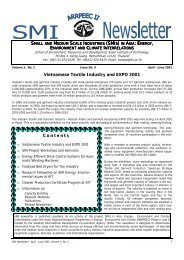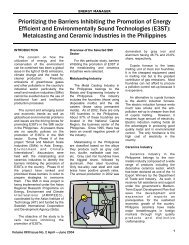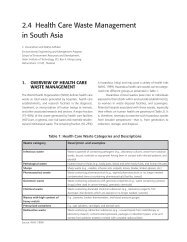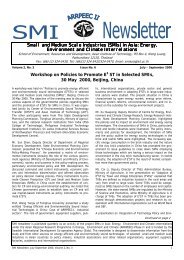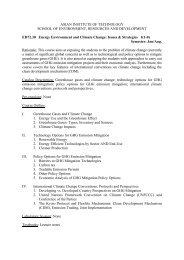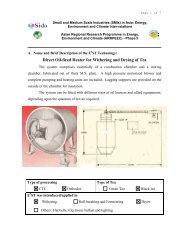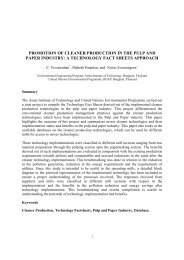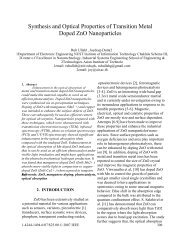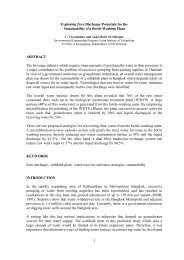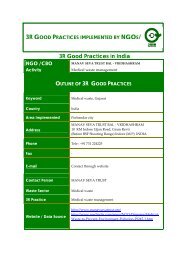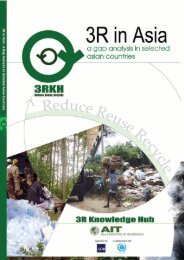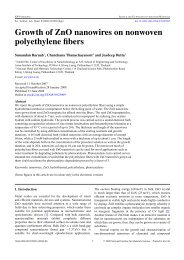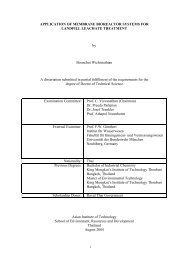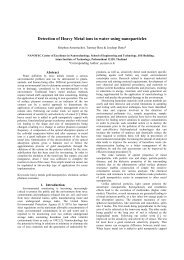Healthcare Waste Report - Environment Health
Healthcare Waste Report - Environment Health
Healthcare Waste Report - Environment Health
Create successful ePaper yourself
Turn your PDF publications into a flip-book with our unique Google optimized e-Paper software.
IFC REQUIREMENTS FOR<br />
HEALTHCARE PROJECTS<br />
The International Finance Corporation (IFC)<br />
is a member of the World Bank Group and as<br />
the name implies the agency provides<br />
investments and advisory services to build the<br />
private sector in developing countries. IFC<br />
fosters sustainable economic growth in<br />
developing countries by financing private<br />
sector investment, mobilizing capital in the<br />
international financial markets, and providing<br />
advisory services to businesses and<br />
governments. IFC applies to all the projects it<br />
finances environmental and social standards to<br />
minimize their impact on the environment<br />
and on affected communities. In keeping its<br />
core values and care for the environment, IFC<br />
has developed a General <strong>Environment</strong>al<br />
<strong>Health</strong> and Safety Guidelines for various<br />
industrial sectors that it finances. The<br />
Guidelines contain information on crosscutting<br />
environmental, health, and safety<br />
issues potentially applicable to all industry<br />
sectors. A specific set of guidelines for<br />
healthcare facilities has also been developed<br />
(IFC, 2007). The following sections provide an<br />
overview of IFC requirements for healthcare<br />
facilities in terms of waste management.<br />
According to the IFC, waste from healthcare<br />
facilities can be divided into two groups. The<br />
first consists of general waste, similar in<br />
composition to domestic waste, generated<br />
during administrative, housekeeping, and<br />
maintenance functions. The second group<br />
consists of specific categories of hazardous<br />
healthcare waste, as categorized by WHO.<br />
<strong><strong>Health</strong>care</strong> facilities are required to establish,<br />
operate and maintain a healthcare waste<br />
management system (HWMS) adequate for<br />
the scale and type of activities and identified<br />
hazards. Facility operators should undertake<br />
regular assessment of waste generation<br />
quantities and categories to facilitate waste<br />
management planning, and investigate<br />
opportunities for waste minimization on a<br />
continuous basis. In addition to the guidance<br />
provided on solid and hazardous waste<br />
management in the General EHS Guidelines,<br />
the HWMS should include the following<br />
components:<br />
<strong>Waste</strong> Minimization, Reuse, and<br />
Recycling<br />
Facilities should consider practices and<br />
procedures to minimize waste generation,<br />
without sacrificing patient hygiene and safety<br />
considerations, including:<br />
Source reduction measures<br />
<strong>Waste</strong> toxicity reduction measures<br />
Use of efficient stock management<br />
practices and monitoring (e.g. for chemical<br />
and pharmaceutical stocks)<br />
Maximization of safe equipment reuse<br />
practices following sterilization and<br />
disinfection (e.g. sharps containers)<br />
119 HEALTHCARE WASTE IN ASIA: INTUITIONS & INSIGHTS




